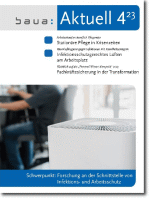OSH in pandemic response
Under this focus programme, the Federal Institute for Occupational Safety and Health (Bundesanstalt für Arbeitsschutz und Arbeitsmedizin, BAuA) is doing research into work-related infection risks and evidence-based protective measures in the workplace.
The COVID-19 pandemic posed major challenges for occupational safety and health (OSH) professionals: lockdowns, home offices, quick tests, and working in face coverings all required action to be taken by every single organisation and employee.

Issue 04/2023 of baua: Aktuell gives an overview of BAuA's research activities under its Infection Control/OSH Interface Focus Programme. Specifically, this issue discusses human beings as sources of bioaerosols, appropriate protective measures such as airing and ventilation for infection control, and much more, including the role of work organisation interventions during the pandemic, in particular at inpatient nursing and residential care settings. baua: Aktuell issue 4/2023 (in German)
The local occurrence of easily transmissible pathogens humanity has never come into contact with before can escalate into a pandemic that has dramatic consequences for the world’s whole population. The complex interaction of numerous factors means pandemic events could happen more frequently in future than in the past. The reasons for this include population growth, globalisation, climate change, anthropogenic encroachments on animal habitats, and pathogens' ability to adapt.
It is therefore vitally important to take appropriate infection control measures in workplaces when responding to a pandemic. This applies, in particular, if infectious pathogens are transmitted as components of bioaerosols. The aim therefore has to be for organisations to implement pandemic plans that include suitable OSH measures and help hold down levels of infection, protect employees’ health, and at the same time allow the economy to keep running.
Workplace situations where, for example, social distancing rules cannot be enforced or home office arrangements are not an option have particular relevance here. The recommendations made for such cases will close the gaps in the legally binding OSH measures that are already stipulated under the German Biological Agents Ordinance (Biostoffverordnung, BioStoffV) for occupational activities with generally increased risks of infection. The legal basis for these measures is laid down in the Technical Rules for Biological Agents (Technische Regeln für Biologische Arbeitsstoffe, TRBA), which are drawn up by the Committee on Biological Agents (Ausschuss für Biologische Arbeitsstoffe, ABAS). The health sector is governed by TRBA 250 and laboratory work by TRBA 100.
Three thematic clusters
This focus programme brings together research on topics connected with infection control and OSH and the development and management of workplace OSH provision. Building on the research conducted during the COVID-19 pandemic, further issues are being addressed and explored in depth within four interdisciplinary clusters:
Epidemiology
The main priority for the Epidemiology of Work-related Infectious Diseases Thematic Cluster is the identification of occupational fields with raised risks of infection and the impacts of their long-term consequences. The findings will inform activity-specific OSH recommendations, in particular for sectors and activities that have so far lacked recommendations of this kind on the protection of employees against infectious pathogens.
Evidence-based Protective Measures
As far as future pandemic pathogens are concerned, it is of central significance to acquire a more precise understanding of their airborne transmission and suitable protective measures. The Evidence-based Protective Measures Thematic Cluster is therefore concentrating on the role played by human beings as sources of bioaerosols and effective infection control in the workplace. The aim is to ensure the strategies and measures available when responding to any future events are as reliable and carefully customised as possible.
Evidence-based Protective Measures
Disinfectants
The experience gained during the pandemic showed that securing the availability of effective disinfectants is a significant factor in the response to a pandemic. This experience is pivotal for the Disinfectants Thematic Cluster, the aim of which is to ensure the lessons learned from COVID-19 can be drawn on to prepare for possible future pandemics and help determine what further research is required.
Organisation
As the SARS-CoV-2 pandemic has shown, companies are faced with particular organisational challenges in the event of a pandemic. The Organisation of Occupational Safety and Health and Infection Protection Thematic Cluster therefore focuses on the nature and success of the organisational measures taken to protect employees during the pandemic as well as the consequences of permanent operational changes for occupational safety and health.
In addition, it is to be examined how far knowledge about patterns of infection (e.g. pandemic phases) among the population can be integrated into workplace infection control concepts. This will serve as the foundation for recommendations on evidence-based action to be drawn up for activities that have not been adequately covered by the Biological Agents Ordinance to date, if at all. Such recommendations are to be formulated with future challenges in mind and dealt with through inter-ministerial channels.









